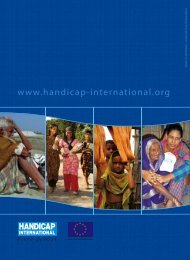Full page photo print - Harvard Law School Project on Disability
Full page photo print - Harvard Law School Project on Disability
Full page photo print - Harvard Law School Project on Disability
Create successful ePaper yourself
Turn your PDF publications into a flip-book with our unique Google optimized e-Paper software.
Pers<strong>on</strong>s with disabilities and hiv/Aids Preventi<strong>on</strong><br />
Pers<strong>on</strong>s with disabilities are often not c<strong>on</strong>sidered to be at risk for c<strong>on</strong>tracting HIV/<br />
AIDS. A study by Yale University and the World Bank states:<br />
It is comm<strong>on</strong>ly assumed that individuals with physical, sensory (deafness,<br />
blindness), or intellectual disabilities are not at high risk of HIV infecti<strong>on</strong>.<br />
They are incorrectly believed to be sexually inactive, unlikely to use drugs or<br />
alcohol, and at less risk of violence or rape than their n<strong>on</strong>-disabled peers. 11<br />
However, there is clear evidence that pers<strong>on</strong>s with disabilities may be at an even<br />
higher risk in many instances and that this risk is increased by the fact that they are<br />
excluded from public educati<strong>on</strong> initiatives aimed at HIV/AIDS preventi<strong>on</strong>.<br />
The discriminati<strong>on</strong> against disabled people manifests itself in numerous<br />
ways. AIDS educati<strong>on</strong> seminars are often held in buildings that are not<br />
wheelchair accessible. Deaf people, many of whom are literate in neither<br />
English nor Swahili, are turned away from AIDS testing centers because<br />
nobody knows how to communicate with them. Educati<strong>on</strong> campaigns, often<br />
<strong>on</strong> radio or televisi<strong>on</strong>, do nothing to reach those who cannot see or hear the<br />
message. 12<br />
community-based services<br />
The CRPD requires that States Parties provide health services specifically required as a<br />
result of a pers<strong>on</strong>’s disabilities and stresses that pers<strong>on</strong>s with disabilities have the right to<br />
receive health care “as close as possible to their own communities, including in rural areas.”<br />
(The right to live in the community is addressed in detail in Part 2, Chapter 11, “Living<br />
Independently and with Dignity in the Community,” p. 148.) In many societies, even when legal<br />
and social discriminati<strong>on</strong> would not force a pers<strong>on</strong> to live in a segregated instituti<strong>on</strong>, pers<strong>on</strong>s<br />
with psychosocial disabilities may find that they can <strong>on</strong>ly access mental health services in<br />
psychiatric instituti<strong>on</strong>s.<br />
The Standard Rules affirm that pers<strong>on</strong>s with disabilities have the right to “provisi<strong>on</strong> of the same<br />
level of medical care within the same system as other pers<strong>on</strong>s.” Therefore, in communities<br />
in which all pers<strong>on</strong>s must travel a far distance from their community to receive health care,<br />
pers<strong>on</strong>s with disabilities must expect to encounter the same disadvantage. However, if a<br />
pers<strong>on</strong>’s disability prevents him/her from traveling this distance because, for instance, public<br />
transportati<strong>on</strong> is not accessible, then this represents an unfair disadvantage and a violati<strong>on</strong><br />
of the right to equal access to health services. In this case, an accommodati<strong>on</strong> must be made<br />
to provide the necessary care in the pers<strong>on</strong>’s home or another locally accessible venue, or<br />
special measures to provide appropriate transportati<strong>on</strong> must be taken.<br />
11 Nora Groce, N., “A Populati<strong>on</strong> at Risk: HIV/AIDS and <strong>Disability</strong>: Capturing Hidden Voices.” Findings of the<br />
Yale/World Bank Global Survey of HIV/AIDS and <strong>Disability</strong>. Washingt<strong>on</strong>, DC: The World Bank, 2004.<br />
http://sitesources.worldbank.org/disability/resources/health-and-wellness/HIVAIDS.pdf<br />
12 “For Africa’s Deaf and Blind, AIDS is an Unknown Language.” New York Times, 28 March 2004.<br />
PART 2: The c<strong>on</strong>venTi<strong>on</strong> <strong>on</strong> The RighTs of PeRs<strong>on</strong>s wiTh disAbiliTies 121




